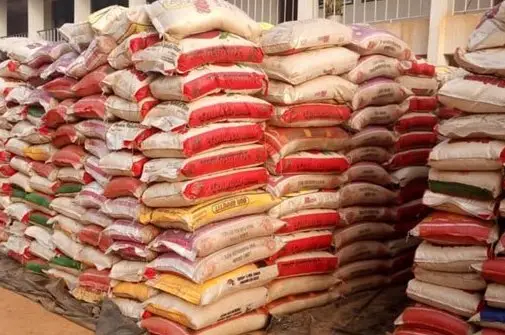The Federal Government is planning to suspend duties, tariffs, and taxes on some essential food items imported through land and sea borders.
It was gathered yesterday that the decision was informed by the need to bring down the cost of food items which have hit the roof, making life unbearable for Nigerians.
Consequently, the Nigerian Association of Chambers of Commerce, Industry, Mines, and Agriculture, NACCIMA, and Centre for Promotion of Private Enterprises, CPPE, in a swift reaction, lauded the government’s decision, saying it would have a positive impact on inflation.
A source also said the listed food items, which include maize, wheat, husked brown rice, and cowpeas, would enjoy a 150-day duty-free import window.
The source said the government recognised the fact that the prices of food items have over the past several months increased in all parts of the country, making life difficult for the people.
‘’The affordability crisis in our food security system has been indexed by the data from the National Bureau of Statistics which by the last count, had put food inflation at 40.66%.
‘’We have heard the cries of Nigeria over the prices of food items and condiments, with some now describing tomato as gold and proposing a variety of recipes to prepare soups and dishes with some of the overly priced food items.
‘’What in the past were regarded as common items such as yam, plantain, and potato now command excessively high figures and Nigerians are right to wonder how and why things are the way they are.
‘’As a government, under the leadership of President Bola Tinubu, members of the Federal
Executive Council and, indeed, all other operatives in the MDAs are fully aware of the hardship occasioned by the high cost of food items in our country,’’ the source said.
According to the source, ‘’There is no doubt that food inflation is a direct consequence of a number of factors. Agricultural production activities have been hampered in some parts of the country by a number of factors resultingb in the inability of smallholder farmers to contribute optimally to the country’s food basket.
‘’This has opened a new dimension to the food challenge from affordability to availability of sufficient food commodities. As you may recall, earlier in the year, there were a number of interventions by the Federal Government to make food available and to dampen their prices.
‘’Those interventions include: the release of 42,000MT of assorted food commodities from the National Strategic Food Reserve, 58,500MT purchase of milled rice from Rice Processors Association of Nigeria and an additional 30,000MT of rice.
‘’Regrettably, prices have continued to escalate, and in some cases these days, food items are becoming unavailable. The government cannot allow this situation to persist. While there are ongoing agricultural initiatives, programmes and projects under the Federal Ministry of Agriculture and Food Security, and state governments also have theirs, we must respond to the creeping availability crisis.
‘’As the government continues to encourage agricultural production on a sustainable and profitable basis for farmers, the time lag between cultivation and harvest makes it inevitable for the government to kick-in stop-gap measures that will bring tremendous relief to Nigerians.
‘’For instance, harvest for 2024 wet season farming will not be due until October-November. On the one hand, while the measures aim to alleviate immediate food shortages, we will strengthen domestic production capabilities to enhance long-term food security.’’
It was further gathered that the difficulty caused by the increasing cost of food items informed the reason President Tinubu constituted the President constituted the Presidential Economic Coordination Council, PECC, in March 2024, under which the Economic Management Team, EMT, recently presented to the President an Accelerated Stabilization and Advancement Plan.
Sources said further that a N2trillion package was recently approved ‘to be spent on actualizing the Accelerated Stabilization and Advancement Plan of which Agriculture is a key focused sector.
‘’The EMT has been meeting day and night working out the best modalities to achieve the best results for Nigerians.
‘’To ameliorate food inflation in the country caused by affordability and exacerbated by availability, the government has taken a raft of measures to be implemented over the next 180 days: They include a 150-day duty-free import window for food commodities; suspension of duties, tariffs and taxes for the importation of certain food commodities (through land and sea borders).
‘’These commodities include maize, husked brown rice, wheat and cowpeas. Under this arrangement, imported food commodities will be subjected to a Recommended Retail Price (RRP).
‘’I am aware that some good citizens might be concerned about the quality of the would-be imported food commodities as it relates to the trending worries around the genetic composition of food). I am glad to reiterate that the government’s position exemplifies standards that would not compromise the safety of the various food items for consumption.
‘’In addition to the importation by the private sector, the Federal Government will import 250,000MT of wheat and 250,000MT of maize. The imported food commodities in their semi-processed state will target supplies to the small-scale processors and millers across the country.
Related posts
Categories
- Advertisements (1)
- Agriculture (45)
- Breaking News (26)
- Business (598)
- Crime (992)
- Education (321)
- Entertainment (128)
- Features (13)
- For The Records (43)
- Foreign News (1,190)
- Health (219)
- Home News (332)
- Interview (9)
- Judiciary (352)
- Lifestyle (140)
- Local News (111)
- National News (1,449)
- Opinion (26)
- Politics (1,014)
- Religion (158)
- Science and Technology (125)
- Security (684)
- Sports (881)
- States' News (822)
- Transportation (330)
- Uncategorized (10)

